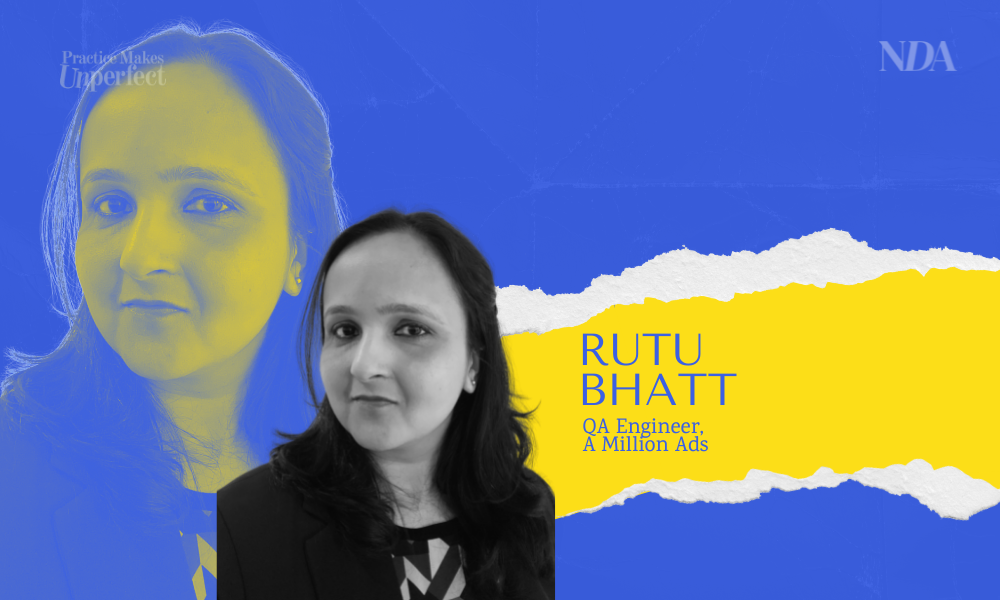By Rutu Bhatt ,QA Engineer at A Million Ads
These articles have been written by the latest cohort of the Practice Makes UnPerfect programme – a course that helps people find and finesse their public voices
“Visualise yourself in front of your laptop… You have a dual monitor setup because you are awesome… Your keyboard has only the best mechanical switches — You open your code editor, (obviously) with a dark UI… You write lines and lines of code and guess what! Your code runs on the first try… you push your code to production on a sunny Friday afternoon.. you press enter and absolutely nothing goes wrong.”
Sounds like an absolute fairy tale, right?
Your calm mind is the ultimate weapon against your challenges.
I’m Rutu and I believe it’s possible that you can achieve this daily!
There are many cliche phrases that feel so generic but “practice makes perfect” wins any day. Although perfection doesn’t exist, mindfulness does. Meditation helped me grow spiritually. An estimated 275 million people suffer from anxiety disorders. That’s around 4% of the global population. Around 62% of those suffering from anxiety are female (170 million), compared with 105 million male sufferers.
Meditation has helped me deal with my anxiety. Not only have I become calmer, wiser and grounded but it has helped me to deal with stress and having better sleep .
60% of people who practise meditation find that it improves their energy, while for 50% meditation aids in their memory and focus. Practising meditation can increase your attention span in only 4 days. For those who are looking for solutions to be a better coder, meditation may just be a tool you need because of the benefit it brings along to deal with your daily challenges.
Before we learn the benefits of meditation, let’s take a step back and understand the connection between meditation and programming.
What are the things a programmer needs to succeed? Coffee and a good working computer (yes) but also creativity, focus and attention. A programmer needs a good attention span for concentration while writing codes. Any programmer working on a development or testing has 100 of things running on their mind such as being stuck on a block of code for too long, dealing with deadlines and merging the code by end of day, worrying about a bug fix, etc. which results in diverting their focus level. This study from Georgia Institute of Technology found that a programmer takes between 10-15 minutes to start editing code after resuming work from an interruption.
Distractions inevitably lead to lack of concentration and result in bugs or glitches in the code. According to a study by The Institute of Mindful Leadership, after being introduced to meditation, only 2% of participants found it difficult to focus on a project from start to finish compared with 28% before the course.
Before you do the practical it’s important to know the theory… Why should you meditate?
As an engineer or coder, you need to take care of your mind as well as body. Our job is essentially a one place job where we rarely move away from our desk. This often leads to health problems like back aches, etc.. I’ve incorporated some good habits to my lifestyle – I prefer to go out for small walks during my lunchtime, practising the 20-20-20 rule from straining my eyes and getting up from my chair and having a big stretch.
The engineer’s brain works hard and we are paid for their problem-solving skills. Billions of neurons hyperwire to enable the coder to think multidimensionally for hours a day, under complex deadlines, day after day. Problem Solving and multitasking at the same time requires you to go inside of your mind and think deeply about complex problems and finding solutions. Your mind needs to be as clear-thinking as it can be. My solution to the problem of overactive mind is mindfulness.
Mindfulness is paying attention to the present moment while putting aside all of the crazy judgments your mind is making about it for a few seconds. Mindfulness is really a journey in which you practice training your “Monkey mind” to a Monk(y) mind.
It is the ultimate experiment, in which you are both an observer and the system under study. I have learned through much trial and error: the voice that truly matters is the silent voice of awareness, consciousness and being in the present. My advice is to start small.
Practice before work
Find a quiet place where you can sit. Time yourself for 2-3 minutes, relax your body, close your eyes, keep it lowered down or open if you prefer and focus on breathing. While you are breathing, your thoughts will stray. That is absolutely acceptable, allow them to roam. Observe and take mental notes of any ideas that arise, let them pass, and instead pay attention to your inhaling and exhaling.
Practice during work.
On an average, people sit for 9-10 hours per day. This can lead to significant health risks. Lay out a yoga mat and begin some stretching or take a stroll down the hall. You can also stand in place and move your arms. Start gentle breathing and self-reflection, and after 2 minutes, you will be back on track.
The practice of meditation is ancient and it’s proven to be effective. There is no doubt it will improve your wellbeing and productivity. And, it can make you a better programmer, but not unless you actually try and practice. All you need to do is close your eyes in 5,4,3,2….









